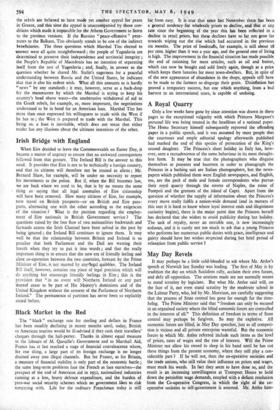Irish Bridge with England
When Eire decided to leave the Commonwealth on Easter Day, it became a matter of urgency to ensure that no awkward consequences followed from that gesture. The Ireland Bill is the answer to this need. It provides that Eire is not to be technically a foreign country, and that its citizens will therefore not be treated as aliens ; Mr. Bernard Shaw, for example, will be under no necessity to report his movements to the police. But if, when the Bill becomes law, we are back where we used to be, that is by no means the same thing as saying that all legal anomalies of Eire citizenship will have been removed. How many citizens of Eire, for example, now travel on British passports—or on British and Eire pass- ports, alternating one with the other according to the exigencies of the situation ? What is the position regarding the employ- ment of Eire nationals in British Government service ? The questions raised by the free flow of two nationalities backwards and forwards across the Irish Channel have been solved in the past by being ignored ; the Ireland Bill continues to ignore them. It may well be that the relationship between Britain and Ireland is so peculiar that both Parliament and the Dail are wasting their breath when they try to put it into words ; and that the really important thing is to ensure that the new era of friendly feeling and close co-operation between the two countries, forecast by the Prime Minister of Eire, is not marred by anyolegal quibbles. The Ireland Bill itself, however, contains one piece of legal precision which will do anything but encourage friendly feelings in Eire ; this is the provision that "in no event will Northern Ireland or any part thereof cease to be part of His Majesty's dominions and of the United Kingdom without the consent of the Parliament of Northern Ireland." The permanence of partition has never been so explicitly stated before.






































 Previous page
Previous page